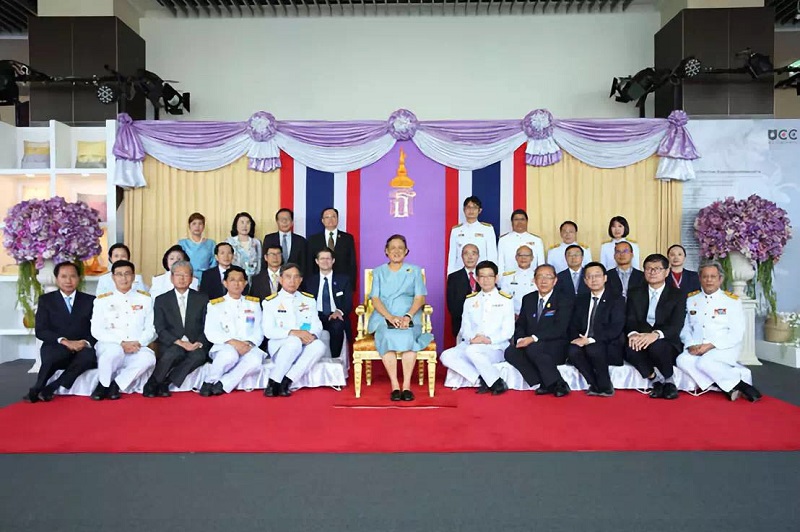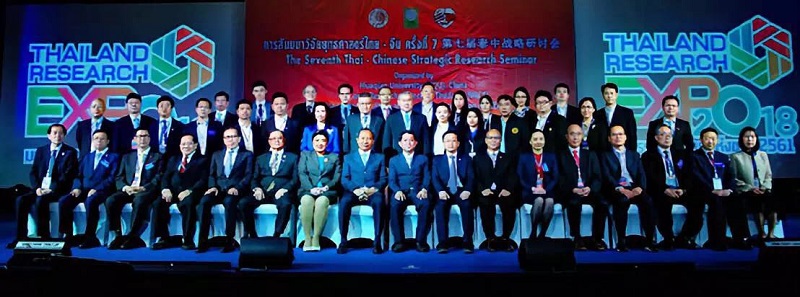 Research Update
Research Update
10
SeptemberFrom August 10 to 15, 2018, the 7th Thailand-China Strategic Seminar was held in Bangkok. This is the highest level academic exchange Between Thailand and China. Professor Xu Qinhua, deputy dean of the National Academy of Development and Strategy (NADS), attended the meeting on behalf of the NADS. She was also invited to meet with Princess Sirindhorn of Thailand and take a group photo.

This seminar explores the prospects and future of China-Thailand strategic cooperation under the new situation with the theme of “Towards Mutual Prosperity”, “One Belt and One Road” and “Thailand 4.0”. Princess Sirindhorn of Thailand and Deputy Prime Minister Prajin attended the opening ceremony. Experts, scholars and government officials from China and Thailand discussed how the two countries will work closely together towards a common prosperity under the new situation of the “One Belt, One Road” initiative and the “Thailand 4.0” development plan. The participating experts believed that China and Thailand have further upgraded to a comprehensive strategic partnership. The “One Belt, One Road” initiative proposed by the Chinese government is a plan that seeks extensive cooperation and mutual benefit and win-win results. Not only will the links between the countries along the line be more closely and more stable, but also promote the cooperation and development of the countries along the line with China in politics, economy and culture.
In her speech, Princess Sirindhorn stated that academic research is the driving force of social development and the Thailand-China Strategic Seminar has contributed to the academic exchanges between the two countries. Thai Deputy Prime Minister Prajin Juntong said in his speech that the Thailand-China Strategic Seminar has been held for six times and is jointly hosted by China and Thailand. The influence of the Seminar has gradually increased, and some of the policy recommendations put forward by the participating experts have become the policy of the Thai government. In his opening speech, Sirirurg Songsivilai, Secretary-General of the National Research Council of Thailand said that the current Sino-Thai strategic cooperation is at a critical development threshold, deepening mutually beneficial cooperation in various fields and further promoting strategic cooperation to achieve new development.
Admiral Suraki Tanatong, Director of the Thailand-China Strategic Research Center of the National Research Council of Thailand, attended the seminar and said that more and more high-quality Thai agricultural products have entered the Alibaba e-commerce platform and have gone global. This is an example of cooperation between Thailand and China. In the second half of the year, Thailand will also lead many northeastern companies to study and learn from Chinese companies. At the same time, he also learned about China's experience in poverty alleviation and poverty alleviation, and offered advice and suggestions to the Thai government.

Professor Xu Qinhua, deputy dean of the NADS of Renmin University of China and director of the “Belt and Road” research center, was interviewed by Yunnan TV during the seminar. She believes that China and Thailand have broad prospects for cooperation in developing a green economy. China is able to provide Thailand with a mature supply of green technology and commodities to meet the local energy endowment and development needs of Thailand. Taking solar energy as an example, Thailand has ample sunshine and good conditions to use and develop solar energy in housing construction and public facilities construction. There is great room for cooperation between the two countries. Thailand can use its unique geographical hub location to form a radiation impact on the green economy development in Southeast Asia, and through cooperation with Chinese companies, it has become a leader in green development in the region.